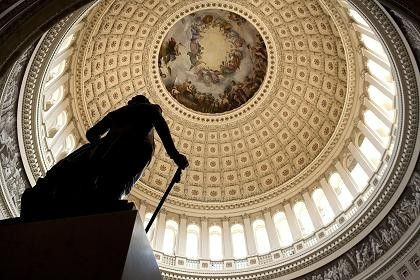Deal Reached in Congress to Avert Federal Shutdown

(REUTERS)-- U.S. lawmakers Thursday night reached a tentative deal to fund an array of government agencies through Sept. 30 and avert shutting down many of Washington's operations starting this weekend.
Sen. Daniel Inouye, D-Hawaii, one of the chief negotiators on the massive spending bill, told reporters the deal had been struck and the full Senate could vote on the measure as early as Friday.
The House of Representatives is expected to vote Friday, a Republican aide said.
Current funding for agencies ranging from the Defense Department and Homeland Security to the Environmental Protection Agency expires at midnight Friday.
Meanwhile, work on a separate but equally important deal to extend a payroll tax cut and long-term unemployment benefits continued in Congress. Negotiations were also aimed at preventing a pay cut for doctors treating elderly patients under Medicare.
A senior Senate Democratic aide said that if a quick agreement cannot be reached on this measure, negotiators could turn to a two-month extension instead of the yearlong one they prefer. The two months would ensure that workers see no drop in their paychecks starting Jan. 1 and it would allow Congress more time to try working out a longer-term deal.
The stumbling block on the year-long measure centered on how to pay the $120 billion cost of continuing a 4.2 percent payroll tax that is scheduled to rise to 6.2 percent for workers on Jan. 1 without congressional action, the aide said.
Earlier Thursday, as congressional negotiators hurriedly searched for compromises, President Barack Obama warned Congress not to leave for a holiday break without finishing its business.
Congress should not and cannot go on vacation before they have made sure that working families aren't seeing their taxes go up by $1,000 and those who are out there looking for work don't see their unemployment insurance expire, Obama said.
Party leaders likely fear a backlash from angry voters who already have lost confidence in Congress's ability to pass even the most basic legislation and will get a chance to render their verdict in the 2012 presidential and congressional elections.
Any deals brokered will have to be approved by the full Senate and House. That is a particular concern for House Speaker John Boehner, R-Ohio, whose Republican caucus includes Tea Party-aligned lawmakers unafraid to buck his leadership when they think he is compromising on conservative principles.
Rep. Joe Walsh, R-Ill., told Reuters that a nearly $1 trillion bill to fund the government through September 2012 would be difficult to support because of its price tag.
If lawmakers nail down the spending and tax measures, they would be able to wrap up work for the year by this weekend or early next week.
Negotiations on the payroll tax cut extension picked up pace after Democrats late on Wednesday dropped their demand that it be paid for with a surtax on millionaires, which Republicans staunchly opposed.
The payroll tax cut would give 160 million Americans about $1,000 a year in additional spending power. The White House and a number of economists say it would boost the country's fragile economic recovery, although many Republicans question that.
On the spending bill, there were some major differences between Democrats and Republicans over policy initiatives backed by federal funds.
Republicans agreed to drop two provisions that would have restricted families living in the United States from traveling to Cuba or transferring money to relatives there, a Republican aide said.
The progress on Capitol Hill on Thursday raised hopes that Congress would avoid the first government shutdown since late 1995 and early 1996.
Earlier in the day, Senate Minority Leader Mitch McConnell, R-Ky., said he was confident and optimistic we'll be able to resolve both (bills) on a bipartisan basis.
(Additional reporting by Kim Dixon, Thomas Ferraro, Donna Smith, Caren Bohan and Charles Abbott; editing by Ross Colvin and Anthony Boadle)
© Copyright Thomson Reuters {{Year}}. All rights reserved.





















